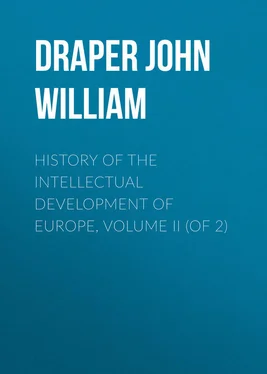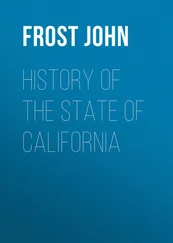John Draper - History of the Intellectual Development of Europe, Volume II (of 2)
Здесь есть возможность читать онлайн «John Draper - History of the Intellectual Development of Europe, Volume II (of 2)» — ознакомительный отрывок электронной книги совершенно бесплатно, а после прочтения отрывка купить полную версию. В некоторых случаях можно слушать аудио, скачать через торрент в формате fb2 и присутствует краткое содержание. Жанр: foreign_antique, foreign_prose, на английском языке. Описание произведения, (предисловие) а так же отзывы посетителей доступны на портале библиотеки ЛибКат.
- Название:History of the Intellectual Development of Europe, Volume II (of 2)
- Автор:
- Жанр:
- Год:неизвестен
- ISBN:нет данных
- Рейтинг книги:4 / 5. Голосов: 1
-
Избранное:Добавить в избранное
- Отзывы:
-
Ваша оценка:
- 80
- 1
- 2
- 3
- 4
- 5
History of the Intellectual Development of Europe, Volume II (of 2): краткое содержание, описание и аннотация
Предлагаем к чтению аннотацию, описание, краткое содержание или предисловие (зависит от того, что написал сам автор книги «History of the Intellectual Development of Europe, Volume II (of 2)»). Если вы не нашли необходимую информацию о книге — напишите в комментариях, мы постараемся отыскать её.
History of the Intellectual Development of Europe, Volume II (of 2) — читать онлайн ознакомительный отрывок
Ниже представлен текст книги, разбитый по страницам. Система сохранения места последней прочитанной страницы, позволяет с удобством читать онлайн бесплатно книгу «History of the Intellectual Development of Europe, Volume II (of 2)», без необходимости каждый раз заново искать на чём Вы остановились. Поставьте закладку, и сможете в любой момент перейти на страницу, на которой закончили чтение.
Интервал:
Закладка:
The pope and the doge divide the spoil.With well-dissembled regret, Innocent took the new order of things in the city of Constantinople under his protection. The bishop of Rome at last appointed the Bishop of Constantinople. The acknowledgment of papal supremacy was complete. Rome and Venice divided between them the ill-gotten gains of their undertaking. If anything had been wanting to open the eyes of Europe, surely what had thus occurred should have been enough. The pope and the doge – the trader in human credulity and the trader of the Adriatic – had shared the spoils of a crusade meant by religious men for the relief of the Holy Land. Works of art carried to Venice.The bronze horses, once brought by Augustus from Alexandria, after his victory over Antony and transferred from Rome to Constantinople by its founder, were set before the Church of St Mark. They were the outward and visible sign of a less obvious event that was taking place. For to Venice was brought a residue of the literary treasures that had escaped the fire and the destroyer; and while her comrades in the outrage were satisfied, in their ignorance, with fictitious relics, she took possession of the poor remnant of the glorious works of art, of letters, and of science. Through these was hastened the intellectual progress of the West.
The punishment of Constantinople.So fell Constantinople, and fell by the parricidal hands of Christians. The days of retribution for the curse she had inflicted on Western civilization were now approaching. In these events she received a first instalment of her punishment. Three hundred years previously, the historian Luitprand, who was sent by the Emperor Otho I. to the court of Nicephorus Phocas, says of her, speaking as an eye-witness, "That city, once so wealthy, so flourishing, is now famished, lying, perjured, deceitful, rapacious, greedy, niggardly, vainglorious;" and since Luitprand's time she had been pursuing a downward career. It might have been expected that the concentration of all the literary and scientific treasures of the Roman empire in Constantinople would have given rise to great mental vigour – that to Europe she would have been a brilliant focus of light. The literary worthlessness of that city.But when the works on jurisprudence by Tribonian, under Justinian, have been mentioned, what is there that remains? There is Stephanus, the grammarian, who wrote a dictionary, and Procopius, the historian, who was secretary to Belisarius in his campaigns. There is then a long interval almost without a literary name, to Theophylact Simocatta, and to the Ladder of Paradise of John Climacus. The mental excitement of the iconoclastic dispute presents us with John of Damascus; and the ninth century, the Myriobiblion and Nomacanon of Photius. Then follows Constantine Porphyrogenitus, vainly and voluminously composing; and Basil II. doubtless truly expresses the opinion of the time, as he certainly does the verdict of posterity respecting the works of his country, when he says that learning is useless and unprofitable lumber. The Alexiad of Anna Comnena, and the history of Byzantine affairs by Nicephorous Bryennius, hardly redeem their age. This barrenness and worthlessness was the effect of the system introduced by Constantine the Great. The long line of emperors had been consistent in one policy – the repression or expulsion of philosophy; and yet it is the uniform testimony of those ages that the Eastern convents were full of secret Platonism – that in stealth, the doctrines of Plato were treasured up in the cells of Asiatic monks. The Byzantines had possessed in art and letters all the best models in the world, yet in a thousand years they never produced one original. Millions of Greeks never advanced one step in philosophy or science – never made a single practical discovery, composed no poem, no tragedy worth perusal. The spirit of their superficial literature – if literature it can be called – is well shadowed forth in the story of the patriarch Photius, who composed at Bagdad, at a distance from his library, an analysis of 280 works he had formerly read. The absurdity of its intellectual pursuits.The final age of the city was signalized by the Baarlamite controversy respecting the mysterious light of Mount Thabor – the possibility of producing a beatific vision and of demonstrating, by an unceasing inspection of the navel for days and nights together, the existence of two eternal principles, a visible and an invisible God!
Cause of all this.What was it that produced this barrenness, this intellectual degradation in Constantinople? The tyranny of Theology over Thought.
But with the capture of Constantinople by the Latins other important events were occurring. Everywhere an intolerance of papal power was engendering. Heresy follows literature.The monasteries became infected, and even from the holy lips of monks words of ominous import might be heard. In the South of France the intellectual insurrection first took form. There the influence of the Mohammedans and Jews beyond the Pyrenees began to manifest itself. Spread of gay literature from Spain.The songs of gallantry; tensons, or poetical contests of minstrels; satires of gay defiance; rivalry in praise of the ladies; lays, serenades, pastourelles, redondes, such as had already drawn forth the condemnation of the sedate Mussulmen of Cordova, had gradually spread through Spain and found a congenial welcome in France. The Troubadours and Trouvères.The Troubadours were singing in the langue d'Oc in the south, and the Trouvères in the langue d'Oil in the north. Thence the merry epidemic spread to Sicily and Italy. Men felt that a relief from the grim ecclesiastic was coming. Kings, dukes, counts, knights, prided themselves on their gentle prowess. The humbler minstrels found patronage among ladies and at courts: sly satires against the priests, and amorous ditties, secured them a welcome among the populace. When the poet was deficient in voice, a jongleur went with him to sing; and often there was added the pleasant accompaniment of a musical instrument. The Provençal or langue d'Oc was thus widely diffused; it served the purposes of those unacquainted with Latin, and gave the Italians a model for thought and versification, to Europe the germs of many of its future melodies. While the young were singing, the old were thinking; while the gay were carried away with romance, the grave were falling into heresy. Commencing resistance of Rome.But, true to her instincts and traditions, the Church had shown her determination to deal rigorously with all such movements. Already, A.D. 1134, Peter de Brueys had been burned in Languedoc for denying infant baptism, the worship of the cross, and transubstantiation. Already Henry the Deacon, the disciple of Peter, had been disposed of by St. Bernard. Already the valleys of Piedmont were full of Waldenses. Already the Poor Men of Lyons were proclaiming the portentous doctrine that the sanctity of a priest lay not in his office, but in the manner of his life. They denounced the wealth of the Church, and the intermingling of bishops in bloodshed and war; they denied transubstantiation, invocation of saints, purgatory, and especially directed their hatred against the sale of indulgences for sin. The rich cities of Languedoc were full of misbelievers. They were given up to poetry, music, dancing. Their people, numbers of whom had been in the Crusades or in Spain, had seen the Saracens. Admiration had taken the place of detestation. Amid shouts of laughter, the Troubadours went through the land, wagging their heads, and slyly winking their eyes, and singing derisive songs about the amours of the priests, and amply earning denunciations as lewd blasphemers and atheists. Innocent III. alarmed at the spread of heresy.Here was a state of things demanding the attention of Innocent. The methods he took for its correction have handed his name down to the maledictions of posterity. He despatched a missive to the Count of Toulouse – who already lay under excommunication for alleged intermeddling with the rights of the clergy – charging him with harbouring heretics and giving offices of emolument to Jews. The count was a man of gay life, having, in emulation of some of his neighbours across the Pyrenees, not fewer than three wives. His offences of that kind were, however, eclipsed by those with which he was now formally charged. It chanced that, in the ensuing disputes, the pope's legate was murdered. There is no reason to believe that Raymond was concerned in the crime. He proclaims a crusade against the Count of Toulouse,But the indignant pope held him responsible; instantly ordered to be published in all directions his excommunication, and called upon Western Christendom to engage in a crusade against him, offering, to him whoever chose to take them, the wealth and possessions of the offender. So thoroughly was he seconded by the preaching of the monks, that half a million of men, it is affirmed, took up arms.
Читать дальшеИнтервал:
Закладка:
Похожие книги на «History of the Intellectual Development of Europe, Volume II (of 2)»
Представляем Вашему вниманию похожие книги на «History of the Intellectual Development of Europe, Volume II (of 2)» списком для выбора. Мы отобрали схожую по названию и смыслу литературу в надежде предоставить читателям больше вариантов отыскать новые, интересные, ещё непрочитанные произведения.
Обсуждение, отзывы о книге «History of the Intellectual Development of Europe, Volume II (of 2)» и просто собственные мнения читателей. Оставьте ваши комментарии, напишите, что Вы думаете о произведении, его смысле или главных героях. Укажите что конкретно понравилось, а что нет, и почему Вы так считаете.












